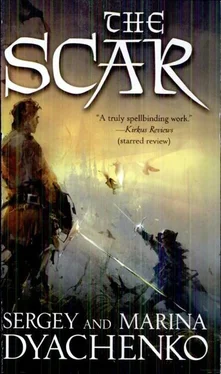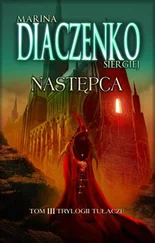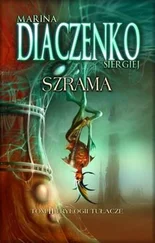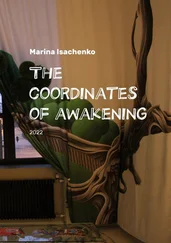Egert tried to remember Toria’s laughing face, but he could not.
* * *
The city, crippled by the Plague, once again wanted to live.
Heirs appeared from both far and near, laying claim to the deserted and properly ransacked houses, factories, and shops. Quarrels and lawsuits sprang up like mushrooms. The guilds, substantially thinned out, retreated from their time-honored rules and admitted apprentices who had not yet completed their studies into their ranks. Both cheerful and spiteful provincials flooded the city gates from dawn till dusk. They were generally ambitious youths who desired to rise quickly above the crowd: that is, to get rich and marry an aristocrat. The aristocrats also returned; once again the clatter of hooves and wheels resounded along the cobblestones, sedans carried by liveried servants swayed through the streets, and children reappeared. Both rosy-cheeked babes in the arms of wet nurses and dirty gutter trash exulted in the clean, white snow that finally fell.
Liveliness reigned in the city during the day, but not one night passed by without the moans and tears of nightmares and sorrowful memories. Madmen, who had lost their reason in the days of the Plague, roamed around the burned houses. They were pitied and feared even by the homeless dogs. Families had been culled, and their losses were unbearable; therefore the city rioted when the voice of the town crier, hoarse from the cold, informed them of the upcoming trial.
After a single night not one window remained intact in the entire university. Those townspeople who did not believe in the heinous crime of the dean and his daughter scolded their neighbors and family members under their breath, alleging their innocence with a single damning argument: It could not be! The majority doubted the logic of this argument, twisted their lips, and shrugged their shoulders: Mages, who knows what they are capable of? Common folk could never understand these mages, and after all, the Plague had to have come from somewhere. Let all sorcerers be damned.
Fighting broke out in the square: a small group of students grappled tooth and nail with a mass of embittered craftsmen. Blood was shed, and only the rough intervention of the guards put an end to the brawl. The students, bloodied and baring their teeth, retreated behind the walls of the university, chased by flying stones.
* * *
“You said Lash would protect us!”
Once the clerk’s son had had round and fat cheeks like a roll. Now his cheeks were deep, sunken, and circles lay around the eyes.
“You said Lash would protect us, but instead…”
“You are alive,” said Fagirra tiredly.
“Yes, but all of them…”
“You are alive. But do not think that the tests have ended.”
The clerk’s son shrank into himself. His blue eyes were enlarged, but they did not look more bright.
“The Order is on the threshold of supreme power,” Fagirra said. “But do not think that the tests are over.”
“I…”
“Keep silent.” Fagirra did not raise his voice, but the son of the clerk wanted to become a wood louse on the wall.
Fagirra looked around him. He smiled rigidly.
“The End of Times will come eventually. Possibly not tomorrow. But it will arrive. And think about whose side you are on.… Go!”
The former student, and now the servant of Lash, slipped from the room, happy that he had been permitted to leave.
Fagirra looked at the wall in front of him for several seconds. The Order might be on the threshold of power, but this was not enough. Sooner or later the monstrous Third Power would enter the Doors of Creation again, and the new Doorkeeper would meet it at the threshold. The Amulet of the Prophet would rust and this little toy was the key to the End of Time.…
But where is it? And why, until now, did the girl keep silent? She will talk. Before or after the trial she will start talking.
* * *
The evening before the trial, the first spectators appeared in front of the courthouse. At dawn the square was so congested with people that the guards had to set their whips in motion to clear a path to the building. People gave way without the benefit of whips, groaning and pressing against one another, before a procession of the acolytes of Lash that made its way to the court. The university gaped with broken windows, but a crowd of students, forcing a path through the shouts and insults, also came. Four sturdy guards with pikes held across their bodies conducted one of them into the courthouse: a tall fair-haired man with a scar on his cheek. A rumor that he was the chief witness went the rounds.
There was far from enough room in the court to let everyone in, but bearing in mind the importance of the trial, the magistrate graciously allowed the townspeople to occupy the space between the doors, as well as the corridor leading outside and the steps of the building, and in the end the spacious courtroom was connected to the square by a wide ribbon of humanity. People reported what they heard from ear to ear like water is delivered from hand to hand during a fire, and everything that was said in the court became the talk of the square within a matter of minutes. The beginning of the hearing kept being delayed; sitting on a long, rickety bench, Egert watched impassively as the acolytes of Lash talked behind the empty judgment seat, as a clerk sharpened his quills, as the bench opposite him was slowly filled with frightened shopkeepers: they were also witness, witnesses of the Plague. Everything must go according to the rules. What a pity that it was impossible to summon to court those unfortunates whose bodies reposed under the hill; what a pity that it was impossible to summon Dean Luayan. He could not rise to his feet from under the earth, not even to help his beloved daughter.
Turning his head toward the hall, Egert saw the fringed caps of the students and instantly averted his eyes.
Two scribes were fidgeting behind a long table. Egert overheard one of them ask the other in a low voice, “Do you have a nail file? My nail broke, damn it!”
The crowd fidgeted, jostled one another, whispered to one another, and examined with equal curiosity the somber decorations of the hall, the scribes, Egert, the guards, the judgment seat, and the toylike gibbet on the table in front of it. It was an exact copy of the one that overlooked the entrance. The prisoner’s dock was empty, but right next to it, perched on a stool, was the short man of unprepossessing appearance dressed in a shapeless smock. A canvas bag rested on his knees, and by its contours Egert’s eyes effortlessly divined the nature of the object concealed inside.
The long-handled pliers.
Ten minutes passed, then another ten. The spectators finally began to look around excitedly, and Egert saw the magistrate striding toward the dais. A man in a hood accompanied him; Egert knew who he was. Treading with difficulty, the magistrate climbed the velvet-pleated steps and sat down heavily in the judgment seat. Fagirra stood next to him without raising his hood, but Egert still felt his observant gaze rest on him. The magistrate sighed something in a strained voice, and the clerk took up his words like a resonant echo.
“Bring in the accused!”
Egert mired his head deep into his shoulders, riveting his eyes to the gray fissures in the stone floor. The noise in the hall dimmed, steel clanged, and then Egert’s ability to feel others’ suffering returned to him.
His head still lowered, Egert’s skin sensed Toria entering the court. She was a solid lump of pain and fear, constricted by her obstinate will. He felt how with her very first glance, covetous, full of hope, she searched the hall for him and how that glance warmed as it settled on him. He realized that she already knew everything. She knew about the role that had been prepared for Egert, but all the same she rejoiced at the opportunity of seeing him; all the same she hoped as devoutly as a child. She placed her hope in this man, most precious to her.
Читать дальше












